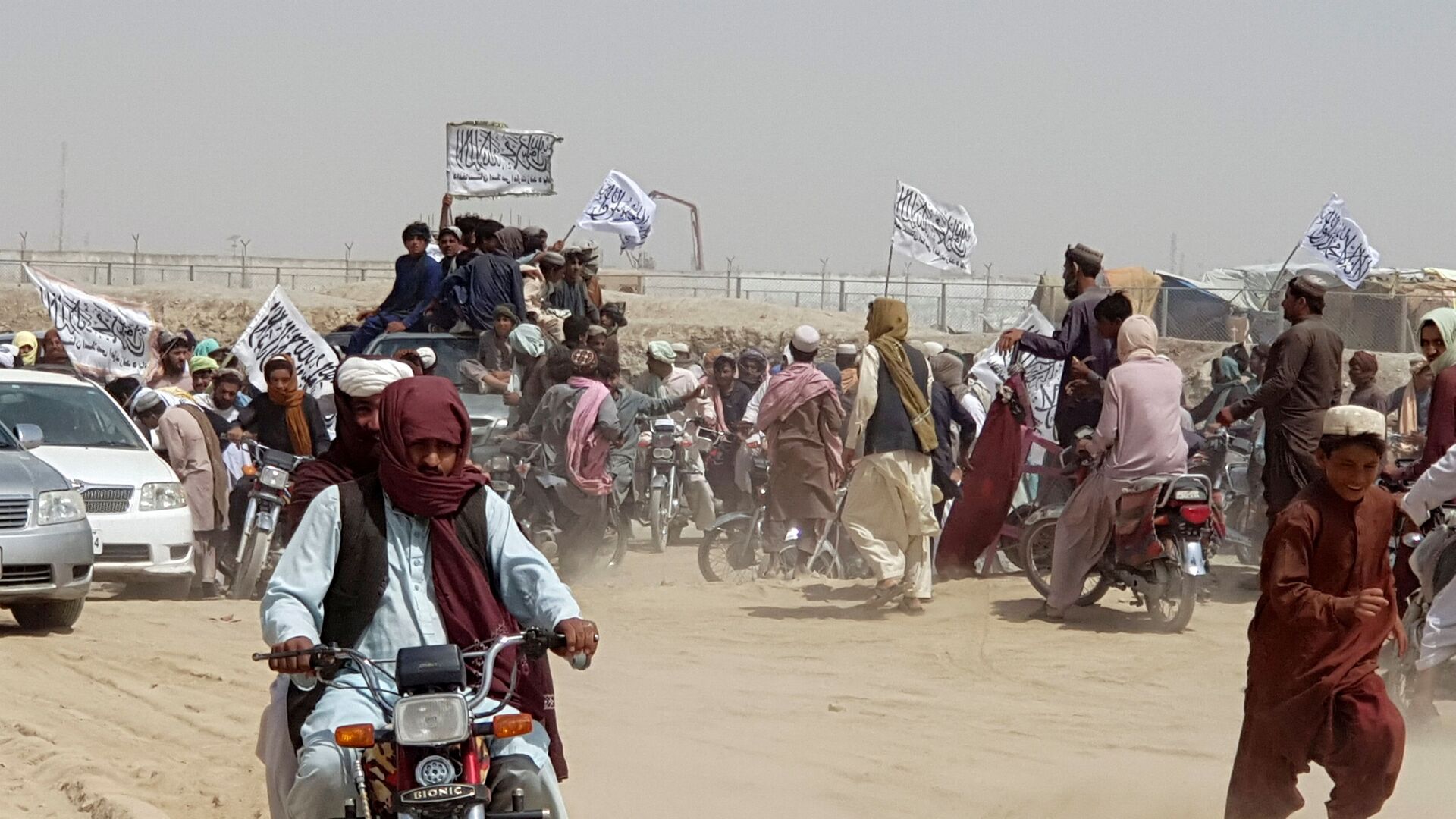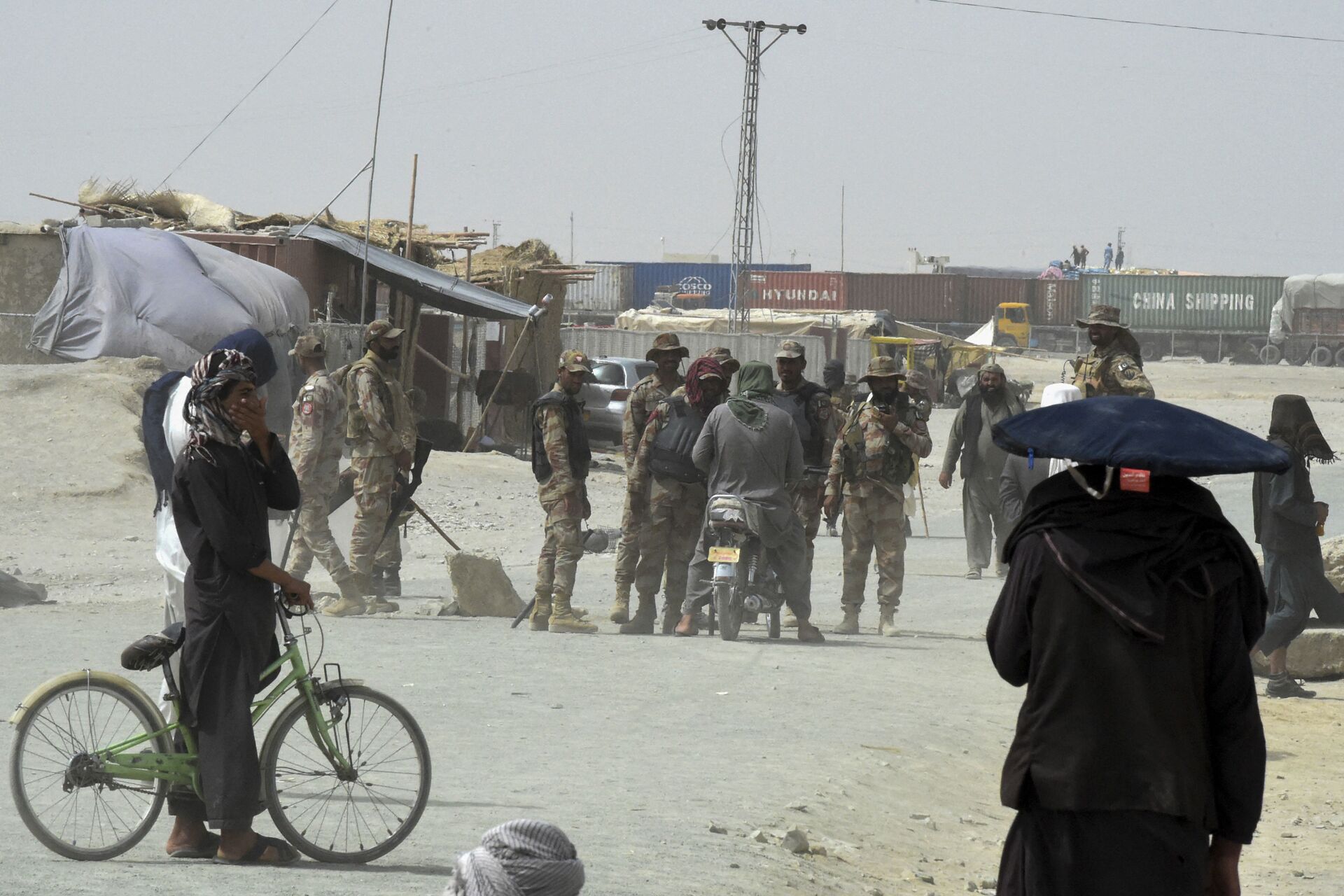Afghan Diplomat M. Ashraf Haidari: Pakistan Backing Taliban to ‘Gain Upper Hand In Afghan Politics’
12:07 GMT 16.07.2021 (Updated: 18:01 GMT 08.12.2022)

© REUTERS / STRINGER
Subscribe
Afghanistan’s vice-president Amrullah Saleh has alleged that Pakistan’s military has warned Afghan forces to expect lethal strikes should Kabul try to re-take the Spin Boldak town from the Taliban militants. The strategic town at the Afghanistan-Pakistan border was seized by the Taliban this week.
Ambassador M. Ashraf Haidari, Afghanistan’s current envoy to Sri Lanka and a former Deputy Assistant National Security Adviser (NSA) in Kabul, has warned that Pakistan’s “support” of the Taliban movement in Afghanistan risks destabilising the entire region, including Pakistan itself.
Haidari, the former Director-General of Policy and Strategy at Afghanistan's foreign affairs ministry, also cautions that letting the Taliban gain power in Kabul this time could prove more dangerous than it was before 2001.
— Ambassador M. Ashraf Haidari (@MAshrafHaidari) August 11, 2021
Edited excerpts:
Sputnik: Afghanistan has often accused Pakistan of supporting the Taliban. More recently, Afghanistan’s foreign minister Mohammad Haneef Atmar asked his Pakistani opposite number Shah Mahmood Qureshi to ensure that Taliban sanctuaries are closed and their funding is cut.
In your view, why does Pakistan support the Taliban?
Ambassador Haidari: In the short run, the Pakistani military establishment may be thinking about gaining some influence over the Afghan politics that favours their narrow definition of national security at the cost of the long-term security of the people of Pakistan, whose needs and demands hardly differ from those of their brothers and sisters in Afghanistan.
It was with this in mind that Foreign Minister Mohammed Haneef Atmar once again reminded his Pakistani counterpart in the recent SCO Foreign Ministerial meeting that it is in the best long-term interests of Pakistan to end its institutional support of the Taliban and use Pakistan's leverage over them to engage in serious and results-driven peace talks.
Indeed, success in this endeavor would not only help Pakistan and Afghanistan to prosper but would enrich the whole region, because the sustainable security and development interests and goals of the whole region are intertwined. There can be no stable Pakistan without a stable Afghanistan and vice versa. And this remains true for the rest of the region.
Sputnik: Why exactly does Pakistan seek this ‘political influence’ in Kabul? Does it want to use the Afghan territory against India? Or are Pakistan’s ambitions solely linked to trade and connectivity?
Ambassador Haidari: First, as far as tensions between India and Pakistan are concerned, that is entirely their own business. They know best what the zero-sum status quo costs both nations, both financially and regarding security.
But it is hard to understand why Pakistan continues to use terrorism and extremism as an instrument of foreign policy to destabilise Afghanistan, despite knowing that for more than 20 years we have been assuring Pakistan of our full support for it to link up with South and Central Asia.
This connectivity facilitates trade, investment and people-to-people ties between the two regions, which will benefit India, Afghanistan, and Pakistan the most. And this same aspiration is shared is by China, Iran, Russia, and all central Asian countries. Despite this, Pakistan continues to destabilise Afghanistan at its own long-term cost.
Sputnik: What could the consequence be for Pakistan, if it were to keep supporting the Taliban?
Ambassador Haidari: The consequences for Pakistan, Afghanistan and the world could be deadlier than what we all witnessed in the 9/11 terror attacks. This time around, the Taliban are more radicalised, much more ignorant, much younger and, as a result, much more lethal. They are destroying any signs of modernity and progress.
Let me give you an example of the war crimes being committed by the Taliban in some of the districts they have recently captured.
In 29 Afghan provinces, they have destroyed 260 public institutions and looted everything from those institutions, which they then set on fire. They have displaced about 4,000 public servants and left about 50,000 others in jobless and terrified. At the same time, they have displaced about 270,000 ordinary Afghans, as the United Nations High Commissioner for Refugees (UNHCR) recently reported.
Overall, the disruption in public services has affected nearly 13 million impoverished Afghans. This is much worse than the situation in the Nineties when the world had forgotten Afghanistan, which later led to the tragedy of 9/11.

Pakistani troops patrol in the border town of Chaman on July 14, 2021, after the Taliban claimed they had captured the Afghan side of the border crossing of Spin Boldak along the frontier with Pakistan
© AFP 2023 / BANARAS KHAN
Sputnik: The Taliban often argues that democracy is incompatible with Afghanistan and has been imposed from outside. A recent declaration after the fourth trilateral meeting between China, Afghanistan and Pakistan also expressed support for a “moderate” Islamic government in Afghanistan.
What do you think?
Ambassador Haidari: The world and the region should not listen to the Taliban. They do not number more than 50,000 or 60,000 people. The world and regional powers - including China, Russia, India, and Iran - should be listening to the 35 million Afghans in Afghanistan. Afghans are naturally egalitarian and want democratic rule, as we have seen over the past 20 years.
That is why the Afghan people have demanded that the Taliban shed foreign control and disengage from violence, and to engage seriously in peace talks to reach a sustainable political settlement. And down the road, they could freely participate in Afghan politics as a means to gain power. But the Taliban understand that the people of Afghanistan would reject them at the ballot box. That is why they say "No" to democracy because it does not conform with their very narrow interpretation of government.
As far as trilateral meetings on Afghanistan are concerned, most of the statements coming out of these meetings call for the establishment of a peaceful, stable, democratic, sovereign, and independent Afghanistan. Let us not forget that all six of our next-door neighbours signed a joint good neighbourly relations declaration back in 2002, in which they reaffirmed their commitment not to interfere in Afghan affairs, including in how we wish to be governed.



